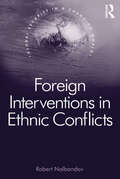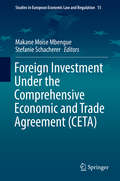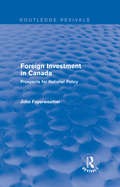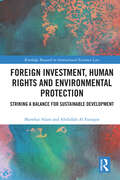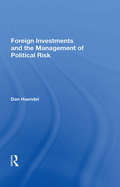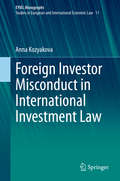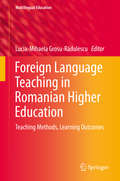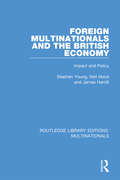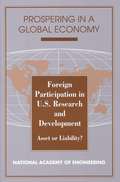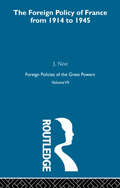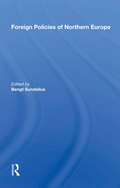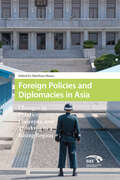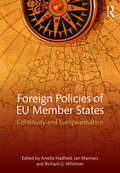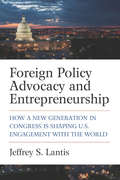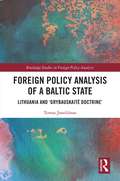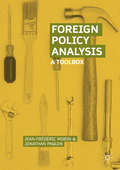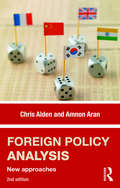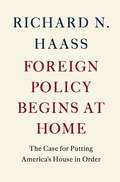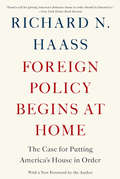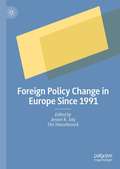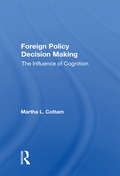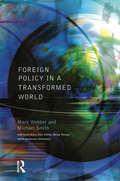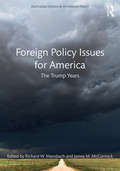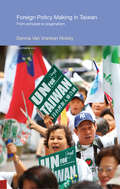- Table View
- List View
Foreign Interventions in Ethnic Conflicts (Global Security in a Changing World)
by Robert NalbandovThis volume analyzes the successes and failures of foreign interventions in intrastate ethnic wars. Adding value to current research in the fields of international security and conflict resolution, it adopts the unique approach of considering successes of third party actions not by durable peace established in a target country (which is the more traditional approach) but by actual fulfilment of intervention goals and objectives, because multilateral interventions are more likely to achieve success in the pursuit of their goals than unilateral actions. Robert Nalbandov takes in-depth studies of interventions in Chad, Georgia, Somalia and Rwanda and relates them to the main theories of international security - the ethnic security dilemma and the credible commitment problem - to produce a fascinating and valuable volume.
Foreign Investment Under the Comprehensive Economic and Trade Agreement (Studies in European Economic Law and Regulation #15)
by Makane Moïse Mbengue Stefanie SchachererThis book analyzes the investment chapter of a new type of trade agreement between Canada and the European Union to help readers gain a better understanding of this mega-regional deal, which includes foreign investment protection. It first provides background information on the Comprehensive Economic and Trade Agreement (CETA), particularly focusing on the chapter on foreign investment, including the rules on the entry of investments, their protection and the stringent dispute settlement mechanism. It goes on to explore whether these provisions are a further step toward reforming the current international investment law regime. It also examines the highly innovative part of the agreement: the inclusion of crosscutting issues, such as sustainable development. In addition, it examines the CETA investment chapter from the perspective of non-contracting parties, including Africa, Asia and Latin America. The book is of interest to academics and students in the field of international investment law. It is also an essential resource for government legal advisers, policymakers, business practitioners, and others dealing with international investment law.
Foreign Investment in Canada: Prospects for National Policy (Routledge Revivals)
by John FayerweatherThis title was first published in 1973: Why do some states enact stronger pollution control progammes than others? And, do stronger controls have identifiable impacts on environmental quality in these states? This work seeks to answer these question by means of combining data, methods and theory from the natural and social sciences.
Foreign Investment, Human Rights and Environmental Protection: Striking a Balance for Sustainable Development (Routledge Research in International Economic Law)
by Shawkat Alam Abdullah Al FaruqueThis book examines the integration of human rights and environmental standards within international investment agreements (IIAs). It explores the intricate relationship between foreign direct investment and sustainable development, emphasizing the necessity for reform in investment treaties to ensure they support rather than hinder human rights and environmental protection.The book begins with an overview of the current international investment law landscape, focusing on its primary goal of investment protection. It then delves into how human rights and environmental standards can shape IIAs, suggesting a new approach to these treaties. The authors explore the incorporation of sustainable development principles into IIAs, the difficulty of balancing investor protection with state regulatory autonomy, and the evolving norms and standards in this area. The book includes detailed case studies on topics such as the interplay between labour standards, investment, and human rights, bilateral investment agreements, sustainable forest management, and the liberalization of water services.Aimed at policymakers, legal scholars, and international law practitioners, this book provides a thorough framework for understanding and reforming IIAs. It offers groundbreaking insights into aligning investment treaties with global sustainable development goals, making it a vital resource for anyone interested in the intersection of investment, human rights, and environmental sustainability.
Foreign Investments And The Management Of Political Risk
by Dan HaendelThis volume focuses on the efforts that multinational enterprises (MNEs) can and must make to evaluate and deal with the political risks they confront in host countries. After discussing various aspects of the relationships between MNEs and host countries, the author considers the definitional and conceptual issues of political risk. He examines th
Foreign Investor Misconduct in International Investment Law (European Yearbook of International Economic Law #11)
by Anna KozyakovaThis book examines the issue of foreign investor misconduct in modern international investment law, focusing on the approach that international investment law as it currently operates has developed towards foreign investor misconduct. The term ‘misconduct’ is not a legal notion, but is used to describe a certain phenomenon, namely, a group/class of actions. This term is convenient since it makes it possible to introduce and describe the phenomenon as such, without a division into concrete types of conduct, like ‘abuse of process’, ‘violation of national law’, ‘corruption’, ‘investment contrary to international norms and standards’, etc. The term ‘misconduct’ is intended to embrace various kinds of conduct on the part of foreign investors that the system of international investment law does not accept – such as that which it regards as illegal, against public policy, or otherwise inappropriate – and triggers legal consequences. Rarely, however, does international investment law clearly articulate what it considers unacceptable investor conduct, and certainly not in any systematic fashion. As such, this book addresses the following questions: What types of investors’ conduct are legally unacceptable? What mechanisms are available to deal with unacceptable investors’ conduct, and what are the legal consequences?
Foreign Language Teaching in Romanian Higher Education: Teaching Methods, Learning Outcomes (Multilingual Education #27)
by Lucia-Mihaela Grosu-RădulescuThis volume gathers recent research findings in the field of foreign language (FL) teaching in Romanian higher education dwelling on both methodology and students’ learning outcomes. The book satisfies the need for an up-to-date overview of FL teaching in Romanian universities in the European context as well as from a global international perspective. This book confers visibility to Romanian foreign language scholars’ research and it opens new paths for debate and collaboration worldwide. The scholars included in this volume have extensive expertise in the field of foreign language teaching and research in higher education which is supported by their international recognition as specialists in their specific areas.The contributing authors approach their respective chapters relying on both qualitative and quantitative research. Their experience and conclusions will prove helpful for any foreign language professional working in tertiary education.
Foreign Multinationals and the British Economy: Impact and Policy (Routledge Library Editions: Multinationals)
by Stephen Young Neil Hood James HamillThis book, first published in 1988, examines the impact of multinational companies on the British economy and the British government’s policy responses. It assesses the effects of multinationals both on the national economy and on different regions and evaluates the benefits and problems brought by overseas companies. It looks at how government has attempted to entice multinationals to invest, and the UK government’s success in these attraction efforts as compared with other countries. Regulatory aspects of policy are also reviewed and evaluated, and consideration is given to possible new policy approaches. This title will be of interest to students of business studies.
Foreign Participation in U.S. Research and Development: Asset or Liability?
by Development Committee on Foreign Participation in U.S. ResearchDuring the past decade, foreign participation in U.S. research and development--through acquisition of R&D-intensive businesses, links with universities, and other arrangements--has expanded rapidly.This emergence of foreign influence has drawn a mixed response--some regard the trend as a positive corollary to the expanding involvement of U.S.-owned companies in national markets abroad. Others consider it a net liability for Americans that often benefits foreign companies and their home economies at U.S. expense.There exists a large gap in expert and public understanding of the drivers, nature, and consequences of foreign participation in the nation's technology enterprise. This volume seeks to close this gap and reviews The nature of R&D activities and how they contribute to economic development. The causes, scope, and nature of foreign involvement in U.S.-based R&D activity and the associated costs, risks, benefits, and opportunities of this trend. The merits and liabilities of policies to regulate foreign R&D participation.
Foreign Pol France 1914-45 V7
by NereFirst published in 2001. Routledge is an imprint of Taylor & Francis, an informa company.
Foreign Policies Of Northern Europe
by Bengt SundeliusThis cross-national treatment of the foreign policies of Northern Europe—Denmark, Finland, Iceland, Norway, Sweden—is organized by substantive policy areas rather than by country, thus allowing most-similar-case analyses of several dimensions of the countries' international relations. The authors make comparisons among the countries in each area of investigation and present details of security, international development, and neighborhood and foreign policy processes. They also describe and explain international and domestic forces that shape the region's external policies. The combination of sound, empirically based data and attention to broader international and theoretical interests allows relevant comparisons with other advanced industrial states.
Foreign Policies and Diplomacies in Asia: Changes in Practice, Concepts, and Thinking in a Rising Region (Global Asia)
by Matthias MaassThe observation of a rising Asia and its rapidly growing economic powerhouses has become a truism. These impressive economic development stories provide the backbone for the growing political assertiveness in the region. Asia's economic prowess is rapidly being transferred onto the diplomatic stage. In the light of these larger developments, the authors of this timely volume investigate the regional and international implications of a rising Asia and problematise critical developments. The first section focuses on the lack of a proper regional security community in Asia. The second part analyses the usefulness of 'Asia' as a catch-all for very distinct sub-regions. While not denying the utility of the concept of Asia as one region, the authors support the need to maintain in parallel a clear focus on issues, approaches, and characteristics that are unique to sub-regions within the continent. A third group of authors probe the regional foreign policies of key players in the region, exploring the security strategies and diplomacies of major regional actors.
Foreign Policies of EU Member States: Continuity and Europeanisation
by Richard G. Whitman Ian Manners Amelia HadfieldForeign Policies of EU Member States provides a clear and current overview of the motivations and outcomes of EU Member States regarding their foreign policy-making within and beyond the EU. It provides an in-depth analysis of intra-EU policy-making and sheds light, in an innovative and understandable way, on the lesser-known aspects of the inter-EU and extra-EU foreign policies of the twenty-eight Member States. The text has an innovative method of thematic organisation in which case study state profiles emerge via dominant foreign policy themes. The text examines the three main policy challenges currently faced by the twenty-eight Member States: First, EU Member States must cooperate within the mechanisms of the EU, including the Common Foreign and Security Policy (CFSP). Second, EU Member States continue to construct their own inter-EU foreign policies. Third, the sovereign prerogative exercised by all EU Member States is to construct their own foreign policies on everything from trade and defence with the rest of the world. This combination of clarity, thematic structure and empirical case studies make this an ideal textbook for all upper-level students of European foreign policy, comparative European politics and European studies.
Foreign Policy Advocacy and Entrepreneurship: How a New Generation in Congress Is Shaping U.S. Engagement with the World
by Jeffrey S LantisForeign Policy Advocacy and Entrepreneurship shows how new and dynamic leaders in Congress are becoming highly influential in policymaking. Capturing the spirit of change in Washington, DC, it explores original case studies of eight US policymakers who challenged authority during the Obama administration—from war veterans and fundamentalist Christian activists to former spies and minority legislators. Newly elected representatives in both parties dove into issues that sometimes seemed well beyond the interests of their constituents and that defied their own party leadership. Setting the course for a new generation of lawmakers, junior entrepreneurs studied here employed a combination of formal legislative strategies for successful influence and informal networking, policy narratives, and communication strategies. While some congressional initiatives have succeeded in changing US foreign policy and others have failed, committed entrepreneurs appear to be gaining greater influence over US foreign policy in the polarized atmosphere of Washington, DC. Cases of entrepreneurship by junior members of Congress represent a puzzle for traditional foreign policy studies that focus on seniority, party discipline, and rigid institutional systems on Capitol Hill. By melding entrepreneurship and policy advocacy literature, this book advances a new typology of foreign policy entrepreneurship, recognizing the impact of multidimensional strategies of influence. The arrival of new members of the 116th Congress, the most diverse in history, provides an exciting laboratory to further test these propositions.
Foreign Policy Analysis of a Baltic State: Lithuania and 'Grybauskaitė Doctrine' (Routledge Studies in Foreign Policy Analysis)
by Tomas JaneliūnasThis book provides a comprehensive analysis of Lithuanian foreign policy by employing the theory of small states and the agent-perspective to assess how President Dalia Grybauskaitė impacted Lithuanian foreign policy in 2009–2019 and which, in turn, could affect changes in international structures. The book is based on original interviews with Grybauskaitė and all her foreign policy advisors, as well as other Lithuanian diplomats and Ministers of Foreign Affairs. In addition to providing an important case study of Lithuanian foreign policy, this monograph also discusses the impact an agent formulating and executing small-state foreign policy may have on the ‘grand structures’ of international relations, such as the EU and NATO. For its investigation of the mutual relationship between agent and structure, this monograph draws on the literature on foreign policy analysis (FPA) and asks questions about the extent to which a particular leader of foreign policy may determine a specific policy decision or outcome. This book will be of particular interest to students of the Baltic region and Russia-Baltic relations, as well as to political scientists and researchers interested in FPA literature, and small-state security.
Foreign Policy Analysis: A Toolbox
by Jean-Frédéric Morin Jonathan PaquinThis book presents the evolution of the field of foreign policy analysis and explains the theories that have structured research in this area over the last 50 years. It provides the essentials of emerging theoretical trends, data and methodological pitfalls and major case-studies and is designed to be a key entry point for graduate students, upper-level undergraduates and scholars into the discipline. The volume features an eclectic panorama of different conceptual, theoretical and methodological approaches to foreign political analysis, focusing on different models of analysis such as two-level game analysis, bureaucratic politics, strategic culture, cybernetics, poliheuristic analysis, cognitive mapping, gender studies, groupthink and the systemic sources of foreign policy. The authors also clarify conceptual notions such as doctrines, ideologies and national interest, through the lenses of foreign policy analysis.
Foreign Policy Analysis: New approaches
by Chris Alden Amnon AranBuilding on the success of the first edition, this revised volume re-invigorates the conversation between foreign policy analysis and international relations. It opens up the discussion, situating existing debates in foreign policy in relation to contemporary concerns in international relations, and provides a concise and accessible account of key areas in foreign policy analysis that are often ignored. Focusing on how foreign policy decision making affects the conduct of states in the international system, and analysing the relationship between policy, agency and actors, the volume examines: foreign policy and bureaucracies domestic sources of foreign policy foreign policy and the state foreign policy and globalization foreign policy and change. Features of the second edition include: a wider range of contemporary case studies and examples from around the globe analysis of new directions in foreign policy analysis including foreign policy implementation and the changing media landscape fully updated material across all chapters to reflect the evolving research agenda in the area. This second edition builds on and expands the theoretical canvas of foreign policy analysis, shaping its ongoing dialogue with international relations and offering an important introduction to the field. It is essential reading for all students of foreign policy and international relations.
Foreign Policy Begins at Home
by Richard N. HaassAmerica must confront an increasingly turbulent world in the near future, as the destabilizing forces of globalization, rapid technological change, demographic imbalance, and financial meltdown merge to create a kind of global Wild West. This world will be a dangerous one, characterized by a resurgence of nationalism and regional conflict, and how we respond will directly affect both our future prospects and the long-term stability of the international community. In "Restoration," Council on Foreign Relations president Richard N. Haass outlines an approach to foreign policy that turns the challenge of this dysfunctional world into an opportunity for renewed American leadership. Weakened by a decade of costly wars, political dysfunction, and fiscal irresponsibility, we have seen our ability to lead severely curtailed. To begin with, we must get our house in order by sharply limiting our interventions in other countries in favor of rebuilding our domestic institutions and tackling our fiscal problems. TodayOCOs world has moved from the bipolarity of the Cold War to the unipolarity of the post-Cold War to what Haass calls the ?non-polarityOCO of the current moment; therefore, the US has to recognize its limits and reorder its priorities accordingly. The days of wars of choice and other indiscriminate military actions are over, and the price of folly is higher than it used to be; when a non-polar world breaks apart, itOCOs much harder to put the pieces back together. HaassOCOs doctrine of Restoration consists of two parts. First, America should focus on strengthening its domestic situation so as to protect itself from the anarchy of a globalized world, whether itOCOs global terrorism, nuclear proliferation, pandemics, or climate change. Haass proposes a number of policies to realize this, including entitlement reform, free trade, more open immigration policies, and public-private partnerships. Second, America must let go of the idea that it can change other countries through unilateral military action. Achieving this will allow us to cut down on the bloated and ineffective defense budget, improve our international reputation, and put our resources where the action will be (the Asia-Pacific instead of the Middle East). By getting its own house in order, the United States has an opportunity to fill the global leadership vacuum and eventually achieve a more expansive and humane foreign policy. "Restoration" lays out a bold vision for how the US can come to shape world events, rather than being shaped by them. "
Foreign Policy Begins at Home: The Case for Putting America's House in Order
by Richard N. HaassA rising China, climate change, terrorism, a nuclear Iran, a turbulent Middle East, and a reckless North Korea all present serious challenges to America’s national security. <P><P>But it depends even more on the United States addressing its burgeoning deficit and debt, crumbling infrastructure, second class schools, and outdated immigration system. <P><P>While there is currently no great rival power threatening America directly, how long this strategic respite lasts, according to Council on Foreign Relations President Richard N. Haass, will depend largely on whether the United States puts its own house in order. <P><P>Haass lays out a compelling vision for restoring America’s power, influence, and ability to lead the world and advocates for a new foreign policy of Restoration that would require the US to limit its involvement in both wars of choice, and humanitarian interventions. <P><P>Offering essential insight into our world of continual unrest, this new edition addresses the major foreign and domestic debates since hardcover publication, including US intervention in Syria, the balance between individual privacy and collective security, and the continuing impact of the sequester.
Foreign Policy Change in Europe Since 1991
by Jeroen K. Joly Tim HaesebrouckIn the past three decades, the world has witnessed many rapid and invasive changes, and seems to be changing countries have adapted their foreign policies to these changes. Building on a clear typology of foreign policy change and a consistent theoretical framework, this book offers a comparative analysis of foreign policy change in Europe throughout the post-Cold War period. Along the lines of our analytical framework, country experts discuss how and why the further ever more rapidly in ways that seemed only imaginable in movies. This book investigates how European foreign policies of eleven European countries have changed over the past thirty years. This book hereby advances our understanding of the phenomenon of foreign policy change and identifies the most important drivers and inhibitors of change.
Foreign Policy Decision Making: The Influence Of Cognition (Westview Special Studies In International Relations)
by Martha CottamAn analysis of decision making and negotiation in international relations, this book offers a political-psychological model of the images that compose policymakers' world views. Dr. Cottam explores the limits these images impose on diplomatic adaptation to changes in the foreign policies of other states. She evaluates established models of politica
Foreign Policy Decision-Making: An Approach to the Study of International Politics
by Richard C. Synder H. W. Bruck Burton SapinForeign Policy Decision-Making helps in strengthening international relations.
Foreign Policy In A Transformed World
by Michael Smith Mark WebberFor 2nd and 3rd year courses in international politics and foreign policy. This text examines foreign policy in relation to 'change and transformation.' It discusses traditional assumptions about foreign policy and foreign policy making, and develops a framework to facilitate analysis of the challenges faced by foreign policy makers in the late 1990s. The central elements of the framework are the foreign policy arena, decision-making and implementation. The book then applies the framework to a set of regional case studies, to explore the global and regional arenas and the challenges to which they give rise. Finally, specific case studies of two countries per region highlight the range of impacts for the changing global and regional context, to focus on the analysis of decision-making and implementation, and to illustrate the benefits of comparative analysis.
Foreign Policy Issues for America: The Trump Years (Routledge Studies in US Foreign Policy)
by Richard W. Mansbach James M. McCormickAs America’s first president never to have served in government or the military, Donald Trump entered the White House with an unformed foreign policy position. Yet he was confronted by a wide range of developing issues; the rise of China, Russian-United States relations, the resurgence of nationalism in Europe, U.S. Foreign Policy in Latin America, environmental challenges, terrorism, security challenges of failing states, cyber security threats, and challenges in international political economy. This volume focuses on these sensitive foreign policy issues that determine the prospects for American decline or continued hegemony. Contributions are divided into ‘regional’ and ‘functional’ issues, exploring the nature and significance of the challenge, the previous response, and President Trump’s policies and their consequences. Topics have been selected to address political, military, economic, and social factors in global politics and the book will appeal to undergraduates and scholars of U.S. foreign policy at all levels.
Foreign Policy Making in Taiwan: From Principle to Pragmatism (Politics in Asia)
by Dennis V. HickeyFollowing President Chen Sui-bian’s victory in the controversial 2004 presidential election, this book examines the future direction of Taiwan’s foreign policy, focusing on the internal and external forces that influence and shape the countries foreign policy decisions today. The author suggests that four levels of analysis – the international system, governmental structure, societal forces and individual factors – pose some explanatory value when seeking to understand Taipei’s foreign policy behaviour. Taiwan’s foreign policy decision-making remains an extremely complex process involving many important variables. However the author’s detailed analysis reveals that external factors, particularly seismic shifts in global politics and the role of China and the US have had an extraordinary degree of influence over the island’s foreign relations. This book highlights these factors as important considerations that continue to play a critical role in shaping Taiwan’s foreign policy. Providing a clear analysis of the dynamics of Taiwan’s foreign policy, Foreign Policy Making in Taiwan is an important addition to the literature on Taiwan and will be essential reading for followers of Chinese politics, comparative politics and foreign policy analysis.
